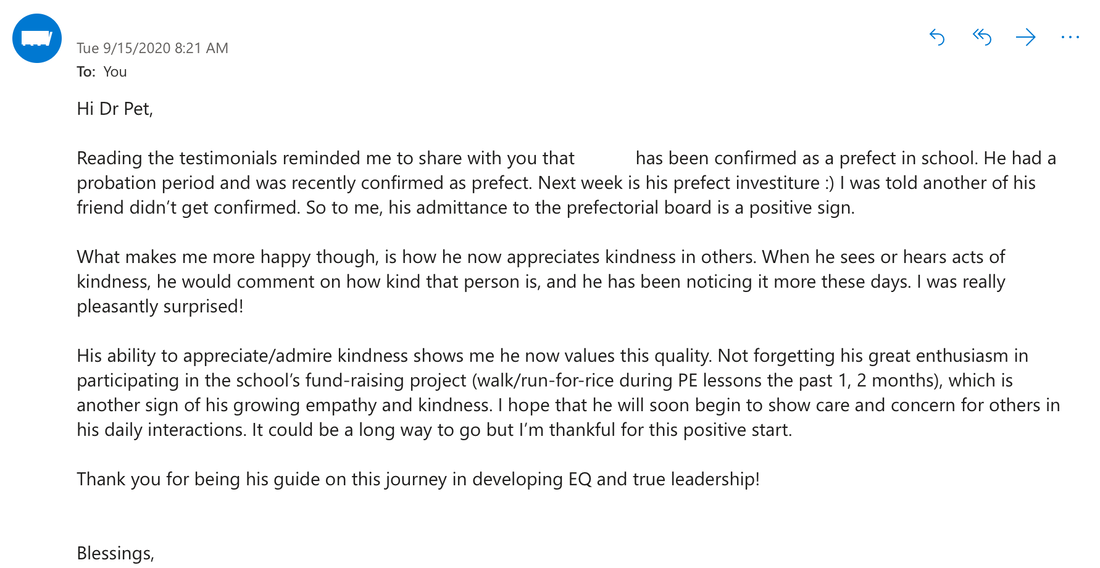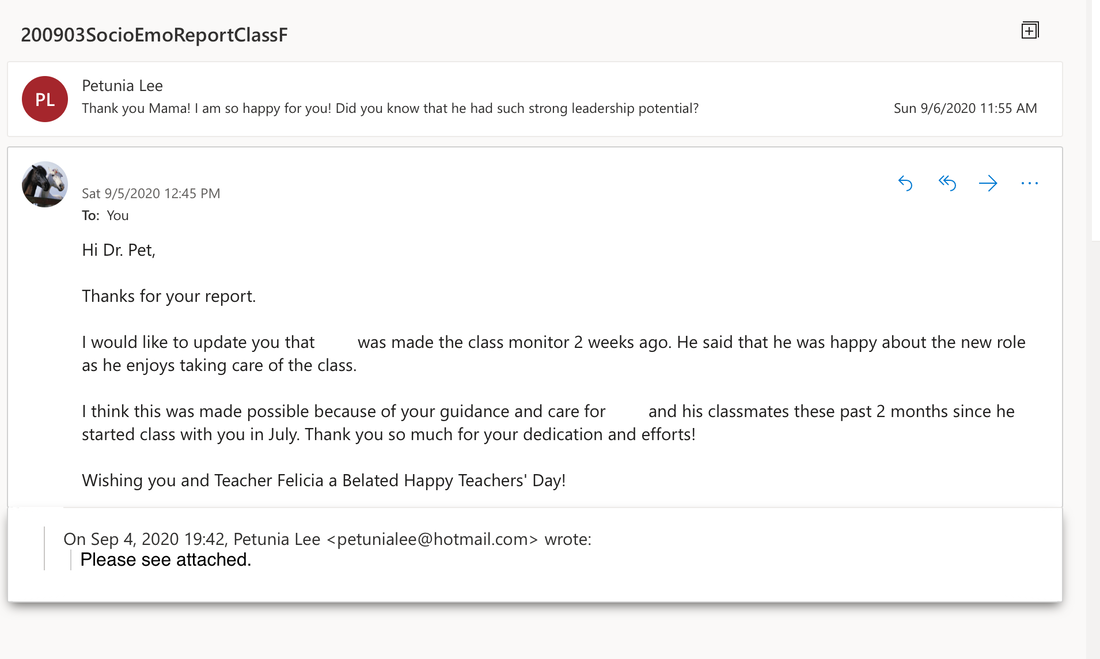|
Someone I know, who attained the pinnacle of his organisation before retiring to travel the world, told me that he once dared not go home because he knew he would be caned for less than stellar exam results. He lived in Chinatown, and his family scoured the streets for him when night fell. You could say that treatment worked because this man grew up into someone quite successful. Yet, these methods no longer work because the school system has become so demanding that terrorising your child is a guarantee of making that child fail in school.
You can scare a child into excelling at rote-learning exams. Thinking exams cannot be aced by fear. I was caned too. Sometimes, the caning drew blood. In some ways, this explains why I seem to understand children. I have never forgotten what it was like to be: - trapped - coerced - beaten - scolded - misunderstood This explains how I learnt to be kind and gentle with people weaker than I am: children, cleaners, road sweepers, garbage collectors, wait staff, delivery men, hawker stall assistants/workers. I learnt long ago that people mistreat the weak because they can. I did not want to be like them. Like most people, I did not think nagging was a very bad thing. It was only recently that I realised that nagging was a form of aggression. It is a micro-aggression. It does not qualify as abuse, like what I detailed above. Yet, it does do damage to the child over weeks and months and years because it is incessant, like a small grain of sand in your shoe as you walk for 100km. Case Study 1 This child's parents came to me ostensibly to get help to motivate the child to do HW. Once this child had warmed up to me, he miserably confided in me, "I hate HW. I hate school." In his eyes, there was a look of desperation, like a soul trapped in agony. When I mapped the family dynamics, more things surfaced. The child was violent at home. It was not just HW. It was anger management. In my class, apart from the 2 first lessons, I saw no anger management issues. Once the child got used to the class environment, he left his preconceived notions behind and became beyond calm. He was unusually reflective and unusually considerate of others. When I described their child in the weekly class report, the parents did not recognise their child. They concluded that their child never shows his ugly side to strangers. Actually, it was simply that there was a key stressor at home which did not appear in my class. Dr. Pet does not nag. She acts. This child's mama nagged nonstop. She used a whining tone to remind her child of this and that. Out of her mouth came a constant stream of feedback for improvement and precious little praise. The situation was particularly acute during HW sessions. The more she nagged, the more he hated HW, the more he resisted, the more tantrums he threw. Nagging hardens the child's stubbornness in the same way a kitchen blowtorch hardens the sugar crystals on top of the crème brûlée into a hard caramel. If you cannot stop nagging, please get in touch for parent coaching. Case Study 2 This child was sneaky. He would do what he was not supposed to do whenever his parents were not looking. Barred from phone games, he secretly played for hours by setting up a brilliant subterfuge. So, he was an extremely intelligent child. If you want someone who will do the right thing when no one is looking, this was NOT the child. We feared. Liew Mun Leong's son, Karl Liew, also thought no one was looking. Pastor Kong Hee also thought no one was looking. So, we feared. I found out that his gentle mama nagged a lot. This was not a violent family. They did not believe in caning children. They tried their best to be kind and loving to their children. Nagging did not appear to be abusive. Nagging is NOT abusive. Yet, it does damage to the child. This child responded in another way. He simply went undercover to do what his Mama nagged him NOT to do. He simply stalled and dawdled and dragged his feet, conveniently forgetting to do his work, or simply stating it was no point to do HW. If you cannot stop nagging, please get in touch for parent coaching. Nagging and PTSD In some young adults, a certain tone can make them raise their psychological defences up high. Speak with them in that tone and it does not matter how reasonable your demand is, they will not acquiesce. They will stubbornly refuse to comply. They had naggy parents. Nagging hardens the child's stubbornness in the same way a kitchen blowtorch hardens the sugar crystals on top of the crème brûlée into a hard caramel. That naggy tone triggers their PTSD. All their psychological defences go up.
0 Comments
Once the Ministry of Education removes the t-score, secondary schools will screen students differently. The importance of EQ, influencing skills and leadership will come to the fore. Even before setting up The Collaboration Corner, Dr. Pet had been quietly teaching her students EQ, influencing and leadership. This is increasingly paying off during the DSA selections.
This child did not take part in Olympiads. She loves to draw, and is crazy about marine animals of all sorts. She started off quiet, dreamy and did not make eye contact. After the first lesson, I complained that she was not paying attention. She later became one of my strongest leaders, and most enthusiastic students. SST has 2 parts to its selection process: - academic testing - team interview (1) a team of students work at a team task (2) a team of students discuss a topic Low EQ kids who cannot work in teams fail the team interview. This child is gifted. Being very smart, he ended up doing all the work for his group. He thought up all the answers, and he told others what to write on the board. If he was wrong, the whole group was wrong. It was a one person team with 3 children. He was impatient and unkind to lesser intellects.
Such an amazing intellect should be taught to lead because when he grows up, no matter how gifted he is, he alone cannot achieve great things. He needed to be taught to move beyond his own intelligence to harness the collective intelligence of others, even if individually, these others were less intelligent than he.  The above piece is on sale at Li Hong Jade. The more I work with children, the more I understand that the notion of "flaw" is very subjective. Parents come to me because their child: - swims competitively and seems to have no desire to win for the sake of winning. - is so stubborn that he simply won't sit down to do HW. - is highly sensitive. Not Competitive Enough To the parent who thought her child could be improved by instilling a fierce competitiveness and desire to win, I asked this, "Mama, do you enjoy living in a bigger house and driving a bigger car than your friends?" Thankfully, the Mama said, "No... I would rather spend my money on books." To which I replied, "Then, your son is like you. If you were the type who was fiercely competitive, you would enjoy being better than your friends in everything. Do you really want a son who wins for the sake of winning? Is it not better to instil the value of cooperativeness and collaboration, given that the modern workplace requires so much teamwork?" A plan formed in my mind on how to turn a supposed flaw into an asset. Too Stubborn This child, when asked to do HW, punched his Mama with his tiny fists and said, "You are a bad Mama!" He had all sorts of ways to resist his mother's best attempts at working with him. As he got bigger sized, his parents worried that the physical violence would get worse. I saw a child with an innate strong will. A strong willed child can go 2 ways. He can grow up into a CEO. He can grow up into a thug. It depends on how we temper the innate strong will when raising the child. The parents' eyes widen when I said that their son had the innate strength of will to be a CEO. They had never seen their child like so. A plan formed in my mind how to turn the supposed flaw into an asset. Highly Sensitive This child was too shy to even enter the classroom on the first day. He was extremely sensitive. On Day 1, in class, he cried. I saw a child whose sensitivity helped him to read faces and to intuitively devise gentle ways to influence peers, without offending them. So, I worked hard at carving him in such a way that turned his flaw into an asset. Carving Children The school system is like a factory. It produces educated children in the manner of mass production. There are clear criteria for what makes a good student: - obedient - diligent - hardworking Teachers in a mass education context do not look carefully at each child and discern within it, its innate pattern. One of the things I love about my job is visualising the potential of each child: - this one can be a good chef... (flaw: cannot spell) - this one has it in him to be an entrepreneur (flaw: full of tricks and other out-of-the-box ideas) - this one would be a great researcher (flaw: so hyper focused that he does not notice people) - that one can do stand up comedy (flaw: disruptive in class) - that one can be CEO (flaw: stubborn) The other thing I love about my job is that I get to carve each child according to its innate shape. Carving Jadeite To me, appreciating and working with children is a lot like working with jadeite. In the picture below, the original raw stone contained many flaws. Anything that is that dark brown colour is not considered high quality jadeite. The only conventionally valuable bit is the pale green translucent bit on the top right of the piece (carved into a baby dragon). However, the carver was able to read the innate pattern pre-existing in the raw stone and use all the flaws in the original stone to carve a thing of beauty. I see children as jadeite pieces. To work with them, we need to honour the shape and colours within. Before this child joined the class, the mother said that he needed a lot of assurance in any new environment. The first day, he was too timid to even enter the class despite being invited to do so, several times. He needed a lot of coaxing to even participate in class.
To everyone's surprise (including mine) I was able to sense stronger than normal innate leadership ability. So, I surfaced the talent and honed it. He has just discovered himself. He now knows he can lead and he loves to lead. |
Author
Petunia Lee, Ph.D Archives
January 2022
Categories
Find out more about our classes!
|




